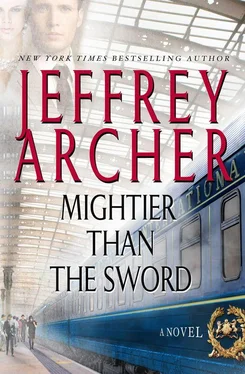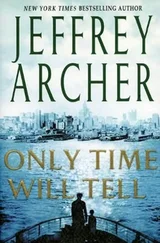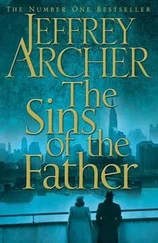“Why aren’t you making him the offer?” Virginia asked, turning to Sloane. “After all, you’re the chairman of the bank.”
“He’d never agree to do business with me,” said Sloane, “not after I got Mrs. Hardcastle to waive her voting rights on the day of her husband’s funeral. But he hasn’t come across Desmond before.”
“And once he’s signed the nondisclosure agreement,” said Mellor, “I’ll make him an offer of three pounds nine shillings a share for his mother’s stock — that’s thirty percent above market value.”
“Surely he’ll be suspicious? After all, he knows you’re a director of the bank.”
“True,” said Sloane, “but as the sole trustee of his father’s estate, it’s his responsibility to get the best possible deal for his mother, and at the moment, she’s living off her dividend which I’ve kept to the minimum for the past two years.”
“After I’ve reminded him of that,” said Mellor, “I’ll deliver the coup de grâce, and tell him that the first thing I intend to do is remove Adrian as chairman of the bank.”
“That should clinch it,” said the major.
“But what’s to stop him getting in touch with Clifton and simply asking for a better price?”
“That’s the beauty of the nondisclosure agreement. He can’t discuss the offer with anyone other than his mother, unless he wants to be reported to the Bar Council. Not a risk a QC would take lightly.”
“And is our other buyer still in place?” asked the major.
“Mr. Bishara is not only in place,” said Sloane, “but he’s confirmed his offer of five pounds a share in writing, and deposited two million pounds with his solicitor to show he’s serious.”
“Why is he willing to pay so much over the odds?” asked Lady Virginia.
“Because the Bank of England has recently turned down his application for a license to trade as a banker in the City of London, and he’s so desperate to get his hands on an English bank with an impeccable reputation that he doesn’t seem to mind how much he pays for Farthings.”
“But won’t the Bank of England object to what is obviously a takeover?” asked Fisher.
“Not if he keeps the same board in place for a couple of years, and I stay on as chairman. Which is why it’s so important that Clifton doesn’t find out what we’re up to.”
“But what happens if Clifton gets his hands on six percent?”
“I’ll also offer him three pounds nine shillings a share,” said Sloane, “which I have a feeling he won’t be able to resist.”
“I’m not so sure,” said Mellor. “I’ve noticed a change of attitude recently. He seems to be working to a completely different agenda.”
“Then I’ll have to rewrite that agenda.”
“The book is where a book should be,” said Mrs. Babakov.
“In a bookshop?” Harry guessed.
Mrs. Babakov smiled. “But no ordinary bookshop.”
“If you want to keep that secret, I’ll understand, especially if its discovery is likely to bring even greater punishment on your husband.”
“What greater punishment could there be? His last words as he handed me the book were, ‘I’ve risked my life for this, and would happily sacrifice it to know it had been published so that the world, and more important the Russian people, can finally be told the truth.’ So I only have one purpose left in life, Mr. Clifton, and that is to see Anatoly’s book published, whatever the consequences. Otherwise every sacrifice he’s made will have been in vain.” She grasped his hand. “You’ll find it in an antiquarian bookshop that specializes in foreign translations on the corner of Nevsky Prospekt and Bolshaya Morskaya Street in Leningrad,” she said, continuing to grasp Harry’s hand like a lonely widow clinging to her only son. “It’s on the top shelf in the farthest corner, between War and Peace in Spanish, and Tess of the d’Urbervilles in French. But don’t look for Uncle Joe, because I hid it in the dust jacket of a Portuguese translation of A Tale of Two Cities . I don’t think too many Portuguese visit that shop.”
Harry smiled. “And if it’s still there, and I’m able to bring it back, are you happy for Mr. Guinzburg to publish it?”
“Anatoly would have been proud to be—” She stopped, smiled again and said, “Anatoly will be proud to be published by the same house as Harry Clifton.”
Harry took an envelope from the inside pocket of his jacket and handed it to her. She opened it slowly and extracted the check. Harry watched to see her reaction, but she simply put the check back in the envelope and returned it to him.
“But surely Anatoly would have wanted you to—”
“Yes, he would,” she said quietly. “But it’s not what I want. Can you imagine the pain he suffers every day? So until he is released, I do not care to live in any degree of comfort. You, of all people, must understand that.”
They sat silently together in the little room, holding hands. As the shadows crept in Harry realized there was no light. She was determined to share her husband’s prison. She displayed such dignity that it was Harry who felt embarrassed. Finally, Mrs. Babakov stood.
“I’ve kept you far too long, Mr. Clifton. I will understand if you decide not to return to Russia, as you have much to lose. And if you do not, I make only one request: please say nothing, until I have found someone who is willing to carry out the task.”
“Mrs. Babakov,” Harry said, “if the book is still there, I will find it. I will bring it back, and it will be published.”
She embraced him and said, “I will of course understand if you change your mind.”
Harry felt both sad and exhilarated as he walked back down the eight flights of stairs to the now-deserted sidewalk. He had to walk for several blocks before he was able to hail a cab, and he didn’t notice the man following him, dodging in and out of the shadows, and occasionally taking a surreptitious photograph.
“Damn,” muttered Harry as the train pulled out of Union Station and began its long journey back to New York. He had been so preoccupied with meeting Mrs. Babakov, he’d quite forgotten to visit the Carnegie. Jessica would chastise him. Wrong tense. Jessica would have chastised him.
Lady Virginia Fenwick
1970
“I would like to open this meeting,” said Adrian Sloane, “by offering my heartiest congratulations to Major Fisher on being elected as a Member of Parliament.”
“Hear, hear,” said Desmond Mellor, patting the new MP on the back.
“Thank you,” said Fisher. “May I say that I consider it an added bonus that it was Giles Barrington I defeated.”
“And if I have my way,” said Sloane, “he won’t be the only Barrington who’s about to suffer a loss. But first, I’m going to ask Desmond to tell us how his meeting with Arnold Hardcastle went.”
“Not well, to begin with, because he clearly wasn’t interested in selling his mother’s shares, even at the inflated price of three pounds nine shillings. But when I told him that my first action as the majority shareholder would be to sack Adrian and remove him from the board, his whole attitude changed.”
“He took the bait?” said Fisher.
“Of course he did,” said Sloane. “He hates me as much as you hate Emma Clifton and Giles Barrington, perhaps even more.”
“That’s not possible,” said Lady Virginia.
“But the clincher,” said Mellor, “was when I told him who I intended to appoint as chairman of Farthings in Adrian’s place.” Mellor couldn’t resist pausing for as long as he felt he could get away with, before saying, “Ross Buchanan.”
Читать дальше












